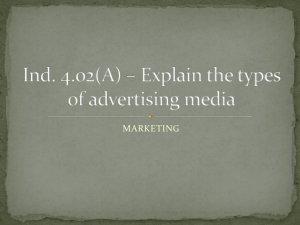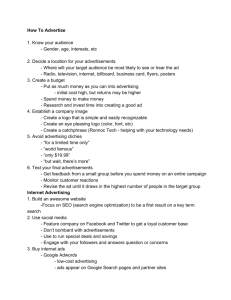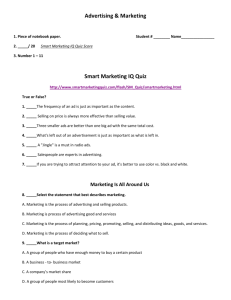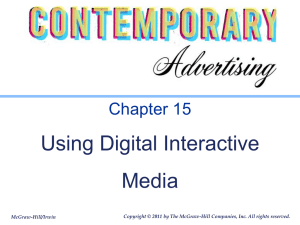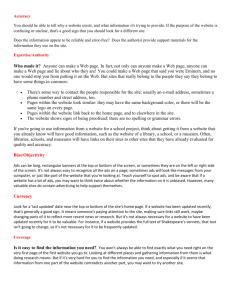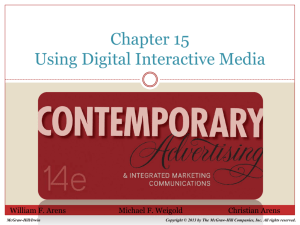E-commerce Advertising
advertisement
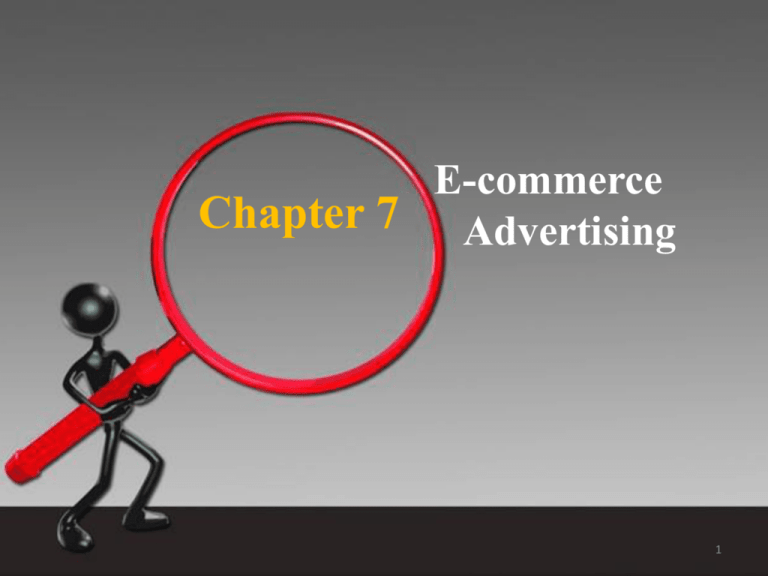
E-commerce Chapter 7 Advertising 1 Marketing Communications Online marketing communications: Methods used by online firms to communicate with consumer and create strong brand expectations Promotional sales communications: Suggest consumer “buy now” and make offers to encourage immediate purchase Branding communications: Focus on extolling differentiable benefits of consuming product or service 2 Marketing Communications(cont.) Online marketing can serve several purposes: Actual sales of products. Promotion/advertising. Customer service. Market research. 3 Online Advertising Paid message on Web site, online service or other interactive medium, such as interactive messaging Advantages: Internet is where audience is moving Ad targeting: Ability to target ads to narrow segments and track performance in almost real time Greater opportunities for interactivity Disadvantages: Cost versus benefit How to adequately measure results Supply of good venues to display ads 4 Online Advertising from 2001-2012 5 Forms of Online Advertisements Display ads Rich media/video ads Search engine advertising In-game ads Social network, blog, and game advertising Sponsorships Referrals (affiliate relationship marketing) E-mail marketing Online catalogs 6 Display Ads Banner ads Rectangular box that links to advertiser’s Web site IAB guidelines Full banner is 468 x 60 pixels, 13K Pop-up ads Appear without user calling for them Provoke negative consumer sentiment Twice as effective as normal banner ads Pop-under ads: Open beneath browser window 7 8 Rich Media/Video Ads Use Flash, DHTML, Java, streaming audio/ video Boost brand awareness by 10% IAB guidelines Linear video ads Non-linear video ads In-banner video ads In-text video ads Other types of rich media ads Interstitials Superstitials 9 10 Rich Media/Video Ads Interstitials: web pages that are displayed before an expected content page, often to display advertisements or confirm the user's age. Superstitials: The distinguishing feature of SUPERSTITIALs is that they load 'behind' a web site, which means a user doesn't see the ads until they're totally downloaded and ready to run 11 Online Advertising Placement Methods Advertising networks (e.g. DoubleClick) Ad agencies with ad placement staff Direct dealing with publisher Banner swapping Arrangements among firms allow each firm to have its banners displayed on other affiliate sites for no cost Advertising exchanges Brokers between advertisers and publishers Place ads and track all activity related to ad 12 Search Engine Advertising One of fastest growing and most effective forms of online marketing communications 40% of online ad spending in 2008 13 Search Engine Advertising Types: Paid inclusion Inclusion in search results Sponsored link areas Paid placement: where advertisers bid payments to a search engine to have their products appear next to keyword search results Keyword advertising e.g. Google AdWords Network keyword advertising (context advertising) e.g. Google AdSense 14 15 Search Engine Advertising (cont’d) Google, Yahoo, MSN are leaders in this technology Issues: Appropriate disclosure of paid inclusion and placement practices • 62% users unaware of difference between paid and unpaid search engine results Search engine click fraud • Competitor hires third parties to fraudulently click on competitor ads to drive up costs Ad nonsense • Google AdSense ads that are inappropriate for content 16 Sponsorships and Referrals Sponsorship Paid effort to tie advertiser’s name to particular information, event, venue in way that reinforces brand in positive yet not overtly commercial manner Referral (affiliate relationship) Permits firm to put logo or banner ad on another firm’s Web site from which users of that site can click through to affiliate’s site 17 E-mail Marketing and the Spam Explosion Direct e-mail marketing: E-mail sent directly to interested consumers who “opt-in” or have not “opted-out” Spam: Unsolicited commercial e-mail Spam is exploding out of control: 70%–80% of all e-mail purportedly is spam Efforts to control spam: • Technology (filtering software) (only partly effective) • Government regulation (CAN-SPAM and state laws) (largely unsuccessful) • Self-regulation by industry (ineffective) • Volunteer efforts (not enough) 18 Percentage of E-mail That Is Spam 19 Spam Categories 20 Online Catalogs Equivalent of paper-based catalogs Graphics-intense; use increasing with increase in broadband use Two types: Full-page spreads • Landsend.com, Restorationhardware.com Grid displays • Amazon, LLBean, Gap.com In general, online and offline catalogs complement each other 21 Social Marketing Adopts many-to-many model Uses digitally enabled networks to spread ads Blog advertising • Online ads related to content of blogs Social network advertising: • Ads on MySpace, Facebook, YouTube, etc. Game advertising: • Downloadable “advergames” • Placing brand-name products within games 22 Behavioral Targeting Web as “Database of Intentions” Behavioral targeting Based on real-time information on visitors Data used to develop profiles Ads delivered based on profile May be hundreds of versions of single ad for different profile groups 2008, U.S. firms spent $1 billion on behavioral targeting; one of fastest growing online marketing techniques Raises privacy concerns 23 Mixing Offline and Online Marketing Communications Traditional offline consumer-oriented industries have learned to use Web to extend brand images and sales campaigns Online companies have learned how to use traditional marketing communications to drive sales to Web site Most successful marketing campaigns incorporate both online and offline tactics 24 Online Marketing Metrics: Lexicon Metrics that focus on success of Web site in achieving audience or market share Impressions Click-through rate (CTR) View-through rate (VTR) Hits Page views Stickiness (duration) Unique visitors Loyalty Reach Recency 25 26 Online Marketing Metrics (cont’d) Metrics that focus on conversion of visitor to customer Acquisition rate Conversion rate Browse-to-buy-ratio View-to-cart ratio Cart conversion rate Checkout conversion rate Abandonment rate Retention rate Attrition rate 27 28 Online Marketing Metrics (cont’d) E-mail metrics Open rate Delivery rate Click-through rate (e-mail) Bounce-back rate Unsubscribe rate Conversion rate (e-mail) 29 30 An Online Consumer Purchasing Model 31 How Well Does Online Advertising Work? Effectiveness measured by ROI, including cost of production Highest click-through rates: Permission e-mail campaigns Video interaction rates high Online channels compare favorably with offline Most powerful marketing campaigns use multiple channels, including online, catalog, TV, radio, newspapers, stores 32 Click-through Rates by Format 2005–2008 33 Comparative ROI How effective is online ads compared to offline? 34 Business to Consumer Marketing Best Practices 35 The most powerful marketing campaign used multiple forms of marketing including online, catalog, TV, radio, newspapers and retail stores. Traditional media (TV & print material) remain the primary means for consumers to find out about new products 36 The Costs of Online Advertising Cost per thousand (CPM): Advertiser pays for impressions in 1,000 unit lots Cost per click (CPC): Pre-negotiated fee for each click ad receives Cost per action (CPA): Pre-negotiated amount only when user performs a specific action Hybrid: Two or more models used together In general, online marketing more expensive on CPM basis, but more effective 37 38 Software for Measuring Online Marketing Results WebTrends: Software program that automatically calculates activities at site, such as abandonment rate, conversion rate, etc. Visual Sciences: Web service that assists marketing managers 39 Web Site Activity Analysis 40 The Web Site as a Marketing Communications Tool Web site can be viewed as extended online advertisement Domain name: First communication e-commerce site has with prospective customer Search engine optimization: Register with as many search engines as possible Ensure that keywords used in Web site description match keywords likely to be used as search terms by user Link site to as many other sites as possible Get professional help 41 Web Site Functionality Main factors in effectiveness of software interface Utility Ease of use Top factors in credibility of Web sites: Design look Information design/structure Information focus The way information is organized is important for first-time users, but declines in importance over time as information content becomes the major factor attracting further visits 42 Factors in the Credibility of Web Sites 43 Web Design Features That Impact Online Purchasing Compelling experience Editorial content Fast download times Easy product list navigation Few clicks to purchase Customer choice agents Responsiveness 44 45
